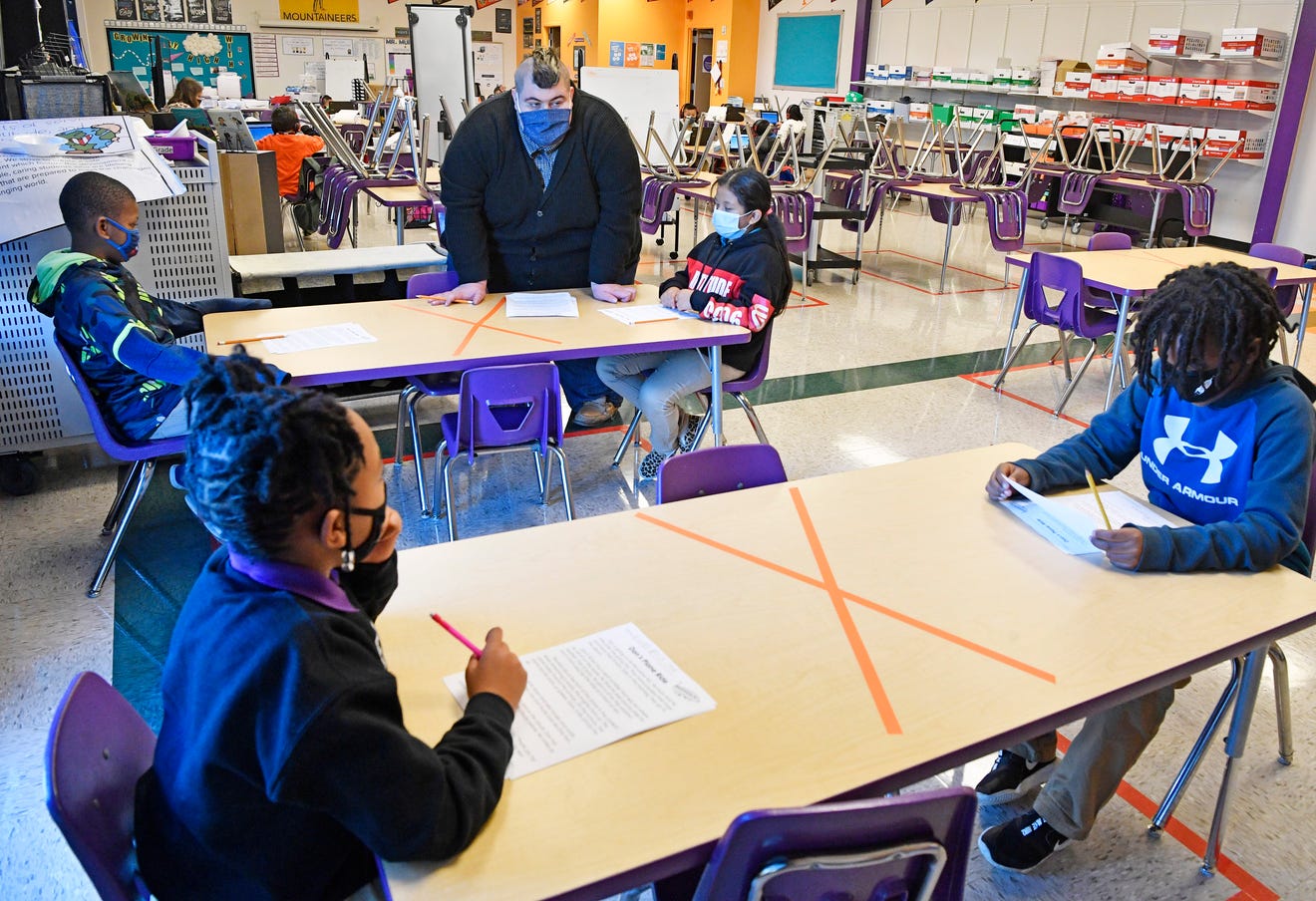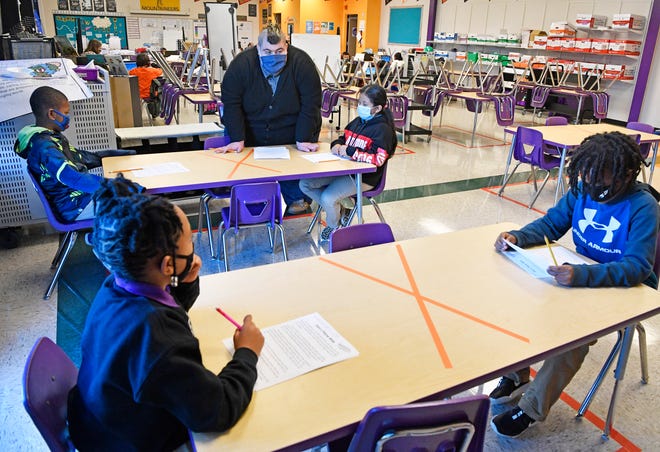
‘I can be like Kamala Harris:’ Nashville students, parents reflect on what the first female vice president-elect means for girls and women
by Meghan Mangrum, The Tennessean
Eliza Maraniss got to stay up past her bedtime one night earlier this month.
Usually, she goes to bed around 7 p.m. or 8 p.m., but this night was special. For the first time she can remember, the 10-year-old watched a president and vice president-elect speak.
And for the first time in the nation’s history, that vice president-elect is a woman.
“It was so exciting because I had never ever seen in my life a president and a vice president talk,” Eliza said. “I think they are going to make a great country for four years We should have women in any (position) because women can do what men can do — vice president, president. Anything we can think of that a boy can do, a girl can do too.”
Eliza wasn’t the only little girl in Nashville — or across the country — staying up late the night President-Elect Joe Biden and Vice President-Elect Kamala Harris delivered their victory speeches after winning the 2020 presidential election.
Across town, London Dollar, 2, gazed at the television screen while Harris spoke from Wilmington, Delaware. London watched a woman who looked a lot like her accept one of the highest positions of power in the free world.
“We try to be intentional about making sure she gets to see people who look like her often in books, on television. That night it was a moment of her seeing the first vice president woman, first vice president Black woman. She was hyped because we were hyped,” Kinita Dollar said of her daughter. “It sounds cliche, but representation really matters.”
Despite President Donald Trump’s unwillingness to concede to Biden and Harris, despite the weeks that remain before the Electoral College formally meets, despite ongoing divisiveness that surrounds this election, millions of young women and girls are celebrating Harris’s historical achievement.
During her victory speech on Nov. 7, the California senator — and now the first woman, first Black person and first person of South Asian descent to be elected to the nation’s second-highest office in 244 years — sent a message to women and girls, especially those of color.
“While I may be the first woman in this office, I will not be the last,” Harris said. “Because every little girl watching tonight sees that this is a country of possibilities.”
Adrianne Wright, a multi-racial Nashville woman and mother of a young daughter, said she is reminded of her race every single day.
“When I was a young girl growing up in predominantly white neighborhoods, I struggled to find the spaces where I belonged, sometimes even wondering if I belonged at all,” Wright said in an email. “Harris being elected is an exceptional moment in our country. It gives me hope, and it gives me breath. Yes, we have a long way to go to fight gender equality, but let us not ignore this significant truth: to be a young girl in this country, and see yourself reflected in leadership is a true message that you belong and that our country is full of possibilities.”
Harris’ election is a celebratory moment for many, but the “why” of its significance can be a tough subject to unpack for both parents and teachers alike.
Victoria Banks Petrelli said her 5-year-old daughter Alexa was surprised that a woman had never been “in charge” before.
“I let both of my daughters stay up past their bedtimes to watch Kamala’s speech. I talked to them about how this is the first time a woman has been vice president, and about how hopefully in their lifetimes they will see a woman president too,” Petrelli said. “My daughter was really surprised to hear that there had never been a woman ‘in charge’ before. She asked me why. That’s a hard question to unpack for your child, who sees things as they should be and not how they are.”
And though teachers often use current elections as real-life connections to topics like the electoral process or the Constitution, it can also be a bit of a balancing act when politics are involved.
Sometimes parents and teachers also don’t realize what young children are seeing and hearing, or the questions they have.
“They have all these questions and a lot of times, we think our kids aren’t ready for this conversation but they are,” said James Cross, a teacher at Rocketship Nashville Northeast Elementary. “They hear things and they don’t always know who to ask to get more information about it.”


Cross, who teaches fourth grade at the Nashville charter school, used the election to connect to a unit he’s been teaching about the U.S. Constitution and several of its amendments since mid-October.
Cross and his students explored the question, “Who was the Constitution written for and inclusive of and who was left out or ignored?”
The students not only discussed the historical significance of Harris’ election but also studied the women’s suffrage movement and Tennessee’s role in the ratification of the 19th Amendment a century ago.
Cross was surprised, not by the initial reaction his students to Harris, but by how quickly they asked deeper questions, like what does Harris’ position of power mean and when might they see a woman elected president.
“A lot of them dived right into the ‘whys.’ It plays into the conversations we had been having in class: Why has it taken so long to have a woman in this position? What is going to happen in the future? Are we going to have another vice president like her in the future? Will we ever have a female president?” Cross said.
It’s important for his students — who are mostly Black or Latino — see people like them not only in the school’s history curriculum but in positions of power in everyday life.
“It’s really, really important for all kids to see that,” Cross said. “Our principal talks a lot about how kids need access to windows and mirrors. It’s important to give our students access to that and to see those images and reflections of themselves so they can understand that there are all sorts of people from different backgrounds who are in these positions and thriving.”
Dollar agrees. She and her husband are also educators for Metro Nashville Public Schools.
When students are able to see someone who looks like them — or different from them — in places of power or look up to someone making history today, it’s easier for them to have “softer hearts toward others,” Dollar said.
“I think we’ve just grazed the place that we have this moment, that we have a woman in one of the highest levels of office in our country,” Dollar said. “The subtle things that hit you at that moment. …We don’t think about women as being the decision-makers for what happens in wars and this woman now gets to make decisions that affect everyone.”
For young girls, like her daughter, “they now have a woman of color that they can watch and see and mold themselves after,” Dollar said. “The ceiling has been shattered for her, there are no more limits.”
Eliza, whose journalist grandfather David Maraniss won a Pulitzer Prize in 1993 for his coverage in The Washington Post of Bill Clinton’s candidacy, was inspired throughout the Biden and Harris campaign.
She and little brother Charlie, 7, held signs outside polling stations and helped their parents reach out to potential voters. As the days dragged on after Election Day, she even kept track of how many electoral votes Biden and President Donald Trump each received and updated her classmates.
“During the election, I had a tab open and I kept looking back every day like ‘Oh my gosh, (Biden) is getting so much closer’ and I kept on giving updates to my friends on Google Hangouts,” Eliza said. “I so anxious and scared when Pennsylvania had 99% reporting and he needed 20 votes!”
When she grows up, Eliza isn’t sure she wants to be president, even if Harris has set such a precedent. Instead, she is thinking about working at her school and encouraging the next generation of students to pursue their dreams.
“I have some advice for any girls who are out there, just believe what you believe, and when you grow up, always stand up for yourself and say to anyone, ‘I can do anything a boy can do, women can do whatever a boy can do too,'” Eliza said. “Even if some girls might be African-American, they can say to anyone, ‘Even if I’m African-American, I can stand up for myself, I can be like Kamala Harris.'”
Meghan Mangrum covers education in Nashville for the USA TODAY NETWORK — Tennessee. Contact her at mmangrum@tennessean.com. Follow her on Twitter @memangrum.
Published on November 19, 2020
Read more stories about: Diversity.


